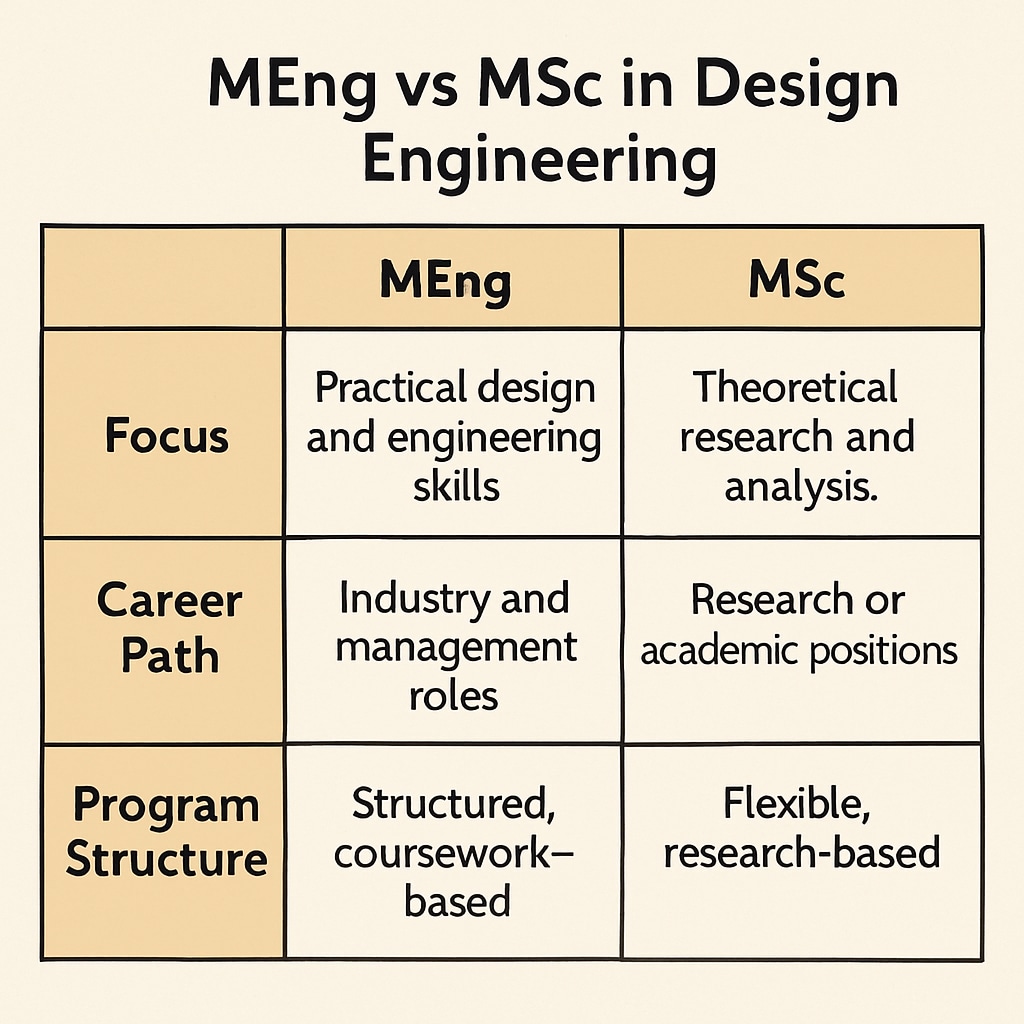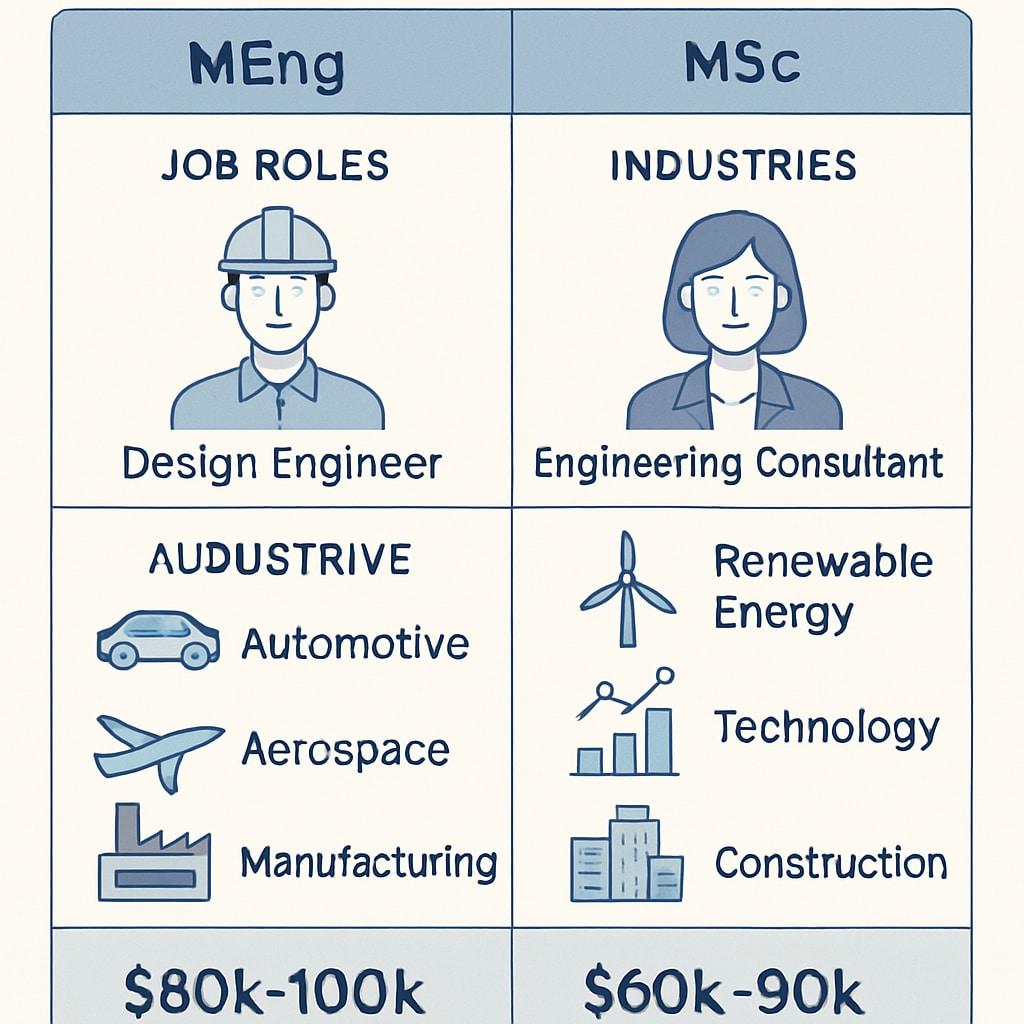Choosing the right degree in design engineering can significantly influence your career trajectory. With options like Bachelor’s, Master’s (MEng or MSc), and even PhDs, navigating this landscape can be overwhelming for students and parents alike. This article delves into the core differences between MEng (Master of Engineering) and MSc (Master of Science) in design engineering, analyzing how they impact employment prospects and career development. By providing examples and insights, we aim to help you make informed decisions about your educational investment.
MEng vs MSc: Understanding the Fundamentals
Both MEng and MSc degrees in design engineering offer advanced knowledge and specialization, but they cater to slightly different career paths and learning objectives. The MEng program is often more practice-oriented and focuses on applying engineering principles in real-world scenarios. It is ideal for students aiming to work in the industry or pursue leadership positions in engineering projects. On the other hand, the MSc program leans more towards research and theoretical understanding, making it suitable for students interested in academia or advanced R&D roles.
For example, an MEng graduate might lead the design and implementation of a sustainable building project, while an MSc graduate could focus on developing new materials for sustainable construction. These differing focuses highlight the importance of aligning your degree choice with your career aspirations.

Career Impact: How Degree Choice Shapes Opportunities
The type of degree you choose can directly impact your career prospects in design engineering. MEng graduates are often favored for roles requiring hands-on expertise, such as product design engineers or systems engineers. Their practical training allows them to transition seamlessly into industry roles. In contrast, MSc graduates are better suited for roles that demand a deeper understanding of analytical methods, such as design researchers or academic lecturers.
According to a report by the Britannica on engineering careers, the demand for design engineers with specialized skills is growing, particularly in sectors like renewable energy, AI-driven design, and biomedical engineering. Employers often prioritize candidates whose educational background aligns with the specific needs of their projects, emphasizing the importance of choosing the right degree.
Additionally, industry connections and internships—which are often integral parts of MEng programs—can provide a significant advantage when entering the job market. MSc programs, however, may offer opportunities to publish research papers and collaborate with academic institutions, opening doors to doctoral studies or high-level research positions.
Educational Investment: Making the Right Choice
When considering the financial and time investments of pursuing a degree in design engineering, it is crucial to weigh the potential return on investment (ROI). MEng programs, typically longer and more intensive, may lead to higher-paying industry roles in the short term. MSc programs, while sometimes shorter, can pave the way for academic achievements and long-term research contributions.
For instance, an MEng graduate might secure a role as a lead design engineer with a starting salary of $75,000 per year, while an MSc graduate pursuing a PhD might initially earn less but could eventually command higher salaries in academic or specialized R&D positions. These scenarios underline the importance of aligning your educational choices with your financial goals and career ambitions.

Making Informed Decisions for Your Future
Ultimately, the choice between MEng and MSc depends on your career goals, learning preferences, and long-term aspirations. High school students and their parents should consider the following questions:
- Do I prefer practical, hands-on learning or theoretical, research-based study?
- What type of career do I envision—industry leadership, research, or academia?
- What is my budget and timeline for achieving my educational and career goals?
Understanding these factors can help you choose a degree that aligns with your aspirations. Additionally, reaching out to alumni, attending open days, and consulting with career advisors can provide further clarity.
For more insights, check out this comprehensive overview of engineering education on Wikipedia, which outlines global trends and program structures.
Readability guidance: Use short paragraphs and bullet points to summarize key points. Employ transition words like “however,” “therefore,” and “in addition” to maintain a smooth flow. Incorporate examples and external references to enhance credibility.


